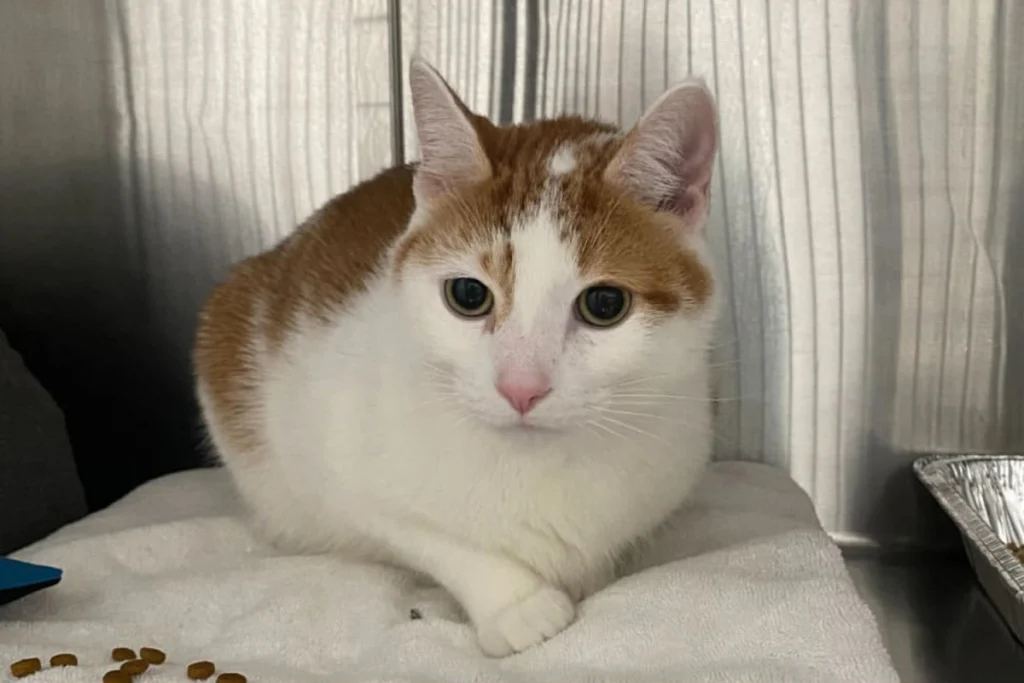The Cat No One Seems to Keep: Sushi’s Struggle to Find a Forever Home
In the cozy confines of New York City’s Meow Parlour cat café, an orange-and-white cat named Sushi has become something of a reluctant regular. His story is both heartbreaking and increasingly common in America’s animal shelters: adopted with hope, returned with regret, and left waiting once again. Since first arriving in January 2021, Sushi has been adopted and returned three times, most recently just last week. His journey reflects a broader crisis in animal adoption, where excitement often gives way to the realities of pet ownership. Despite being healthy and behaviorally sound, this shy, gentle cat finds himself back at square one, emblematic of the challenges many adult cats face in finding stable homes in a system where kitten adoptions dominate and commitment sometimes falters.
Sushi’s story began promisingly enough. After his initial arrival at Meow Parlour, the sweet but timid feline was quickly adopted. However, that first placement lasted only two months before he was returned to the café. Soon after, a second adoption seemed more promising, and for nearly four years, it appeared Sushi had finally found his forever home. The café staff breathed a collective sigh of relief, believing his cycle of uncertainty had ended. But in July 2024, the café received disappointing news – Sushi’s adopters had developed severe allergies and could no longer keep him. Once again, the gentle cat found himself displaced, spending time in a foster home to recover emotionally before returning to the café’s adoption floor. Each transition has taken its toll; when Sushi returned to the café after his long absence, he was initially too frightened to leave the back room, requiring gentle encouragement to rejoin the social environment.
This pattern of adoption and return isn’t just emotionally taxing for Sushi – it’s representative of a larger crisis facing animal shelters nationwide. According to data from Shelter Animals Count, more than 2.8 million dogs and cats entered shelters in just the first half of 2023, creating a troubling imbalance: by mid-year, 1.75 million more animals had entered shelters than had left them. While nearly 1.9 million pets were adopted during this period, a concerning trend emerged specifically for cats like Sushi – adoptions of adult and senior felines dropped by 7 percent compared to the previous year. This statistical disadvantage creates an uphill battle for cats who have outgrown their kitten stage, leaving them waiting longer for homes and more vulnerable to the cycle of returns that Sushi has experienced.
The reasons for returns vary widely across the hundreds of thousands of animals returned to shelters annually in the United States. Sometimes, as in Sushi’s most recent case, it’s an unforeseen development like allergies. Other times, it’s financial constraints, housing changes, or simply a mismatch between expectations and reality. What makes Sushi’s situation particularly poignant is that there’s nothing “wrong” with him – he has a clean bill of health and no significant behavioral issues. His caregivers describe him simply as a shy, gentle soul who needs what any cat deserves: patience, time, and consistency. The psychological impact of multiple returns can’t be understated; each new environment requires adjustment, and each return risks reinforcing insecurities and fear responses. For sensitive cats like Sushi, the cycle can become increasingly difficult to break as they grow more cautious with each disappointment.
Despite the challenges, Meow Parlour remains optimistic about Sushi’s future. “Sushi has endured a lot of change, but we know his perfect adopter is out there,” the café shared on Instagram. “He just needs someone willing to give him the time he deserves to feel truly at home.” This sentiment captures both the heartache and hope that shelter workers across the country experience daily. They witness the excitement of adoptions and the devastation of returns, all while working to maintain the physical and emotional health of animals in their care. For cats like Sushi, the ideal adopter isn’t necessarily someone with the perfect home setup or unlimited resources – rather, it’s someone with patience, understanding, and most importantly, commitment to weather the adjustment period and build a lasting bond.
Sushi’s story, while individual, serves as a microcosm of the larger challenges facing animal adoption in America today. As shelters continue to fill faster than they empty, and as adult cat adoptions specifically decline, the need for committed adopters grows more urgent. Potential pet owners are increasingly encouraged to view adoption as a lifetime commitment rather than a trial period. For Sushi and countless other shelter animals, stability isn’t just a comfort – it’s essential for their wellbeing. His ongoing search for a permanent home reminds us that behind the statistics are individual animals with histories, personalities, and needs, all waiting for someone to recognize their value and provide the consistency they deserve. Perhaps Sushi’s fourth adoption will be his last, marking the end of his journey through the system and the beginning of the peaceful life every shelter animal hopes to find.


